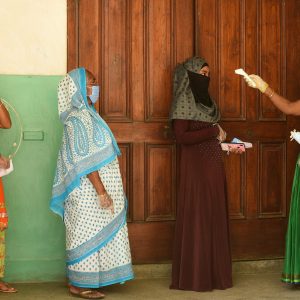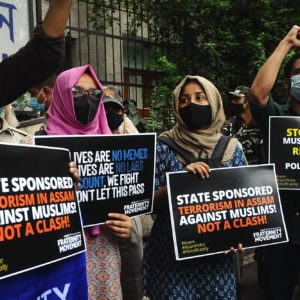Modi gets a boost in India’s high-stake polls
The Indian prime minister’s Hindu nationalist party has retained power in Uttar Pradesh, signifying wide approval of its divisive politics ahead of national elections in 2024.
Author:
14 March 2022

Prime Minister Narendra Modi’s Bharatiya Janata Party (BJP) will form a government for a second term in India’s most politically influential state, Uttar Pradesh. The Saffron party has taken an insurmountable lead over the opposition and a larger vote share than in previous elections. It will be the first time since 1985 that an incumbent party will be returning to power in the state.
Modi’s Hindu nationalist BJP is also poised to win three other states: Uttarakhand, Manipur and Goa. But in Punjab, the Aam Aadmi Party (AAP) is making history by ousting the Indian National Congress. This is an accomplishment for the AAP, which has long wanted to establish itself as a political force outside the national capital Delhi, where it has been in power since 2015.
The BJP is retaking power in Uttarakhand, where it holds 47 seats, 11 more than the minimum majority in the 70-seat assembly. This is a marginal slide from its 57 seats won in the 2017 elections. In Goa, the BJP will return to power for a third consecutive term with a near majority in the 40-member Goa legislative. The party captured half of the seats. In Manipur, the BJP has seized control from the Congress and 32 seats in the 60-member assembly.
Related article:
With an estimated 150 million voters in Uttar Pradesh, a predominantly impoverished and little-developed state where nearly 38% of people live in abject poverty, the BJP won 273 seats out of the 403 assembly seats – well ahead of the simple majority needed to form a government.
The main challenge to the BJP government, led by Hindu monk-turned-politician Ajay Kumar Bisht, known as Yogi Adityanath, came from the Samajwadi Party (SP), which nearly doubled its seats. The SP had stitched together a diverse coalition with smaller parties and hoped to supplement its Muslim-Yadav support base with voters from the Other Backward Classes (OBCs).
It was ousted in 2017, and its improvement in these polls can be attributed to the defection of several legislators, including two senior ministers from the BJP. These leaders enjoyed clout among the non-Yadav OBCs, which played a crucial role in ensuring the BJP’s victory then.
In the 2017 polls, India’s main opposition party, the Congress, won only seven seats with a mere 6.2% of the votes in Uttar Pradesh. Its downward slide has continued.
A whiff of what’s to come
Elections are practically a year-round affair in India, but none are more critical or consequential than the assembly polls in Uttar Pradesh. With 80 parliamentary seats, the state holds the key to power at national level and is thought to be the “direct ladder” to national politics. The poll outcome also provides insights into the national sentiment ahead of the 2024 parliamentary elections.
With an estimated 230 million people, Uttar Pradesh is also India’s most populous state, and the BJP’s landslide victory is touted as a mid-term gauge of Modi’s popularity as well as the support of the BJP’s Hindu-centred agenda among the wider public. “This victory is a win for Modi’s policies and people trust Modi and have granted [the BJP] another chance to serve better,” Yogi Adityanath said following the announcement of results.
Related article:
With a largely fractured and weak opposition, Modi’s hold on power faces no immediate threat. This is despite his “strongman” leadership being sharply criticised over his handling of the Covid-19 pandemic that left the economy battered, and his controversial agricultural laws that were revoked in the wake of farmer protests.
The BJP’s unprecedented three-fourths majority in the previous state elections hinged on its success in wooing votes from communities that had traditionally not voted for it. The party accomplished this by playing up the caste and religious friction in the state and combined that with promises of economic prosperity.
Called it wrong
Covid-induced lockdowns had a significant impact on the Indian economy. Thousands of migrants, especially from Uttar Pradesh’s hinterlands, were left in financial peril and unemployment rose even more, which was deemed a critical issue for voters in these elections. The BJP was also projected to face hostility from farmers in the state’s sugar cane belt – dominated by the Hindu Jat community and Muslim farmers – along with the Sikh farmers of nearby Punjab who formed the backbone of year-long protests against the farms laws.
Observers had contended that if the BJP suffered any losses in the Uttar Pradesh polls, the political tide in the country could swing as it would diminish the party’s national footprint, encourage the opposition to pursue a vigorous battle and undercut Modi’s well-crafted public image as a strong leader.
Yogi Adityanath is notorious for making sectarian remarks about Muslims and openly speaks the language of Hindu supremacy. His re-election can also be read as approval of his Hindutva politics and indicate that he has the potential candidacy to become prime minister.
Related article:
During his tenure, Yogi Adityanath has renamed cities and towns with Muslim names, revised textbooks to diminish India’s Muslim history and enacted punitive laws to discourage interfaith marriages. He has also prohibited the so-called love jihad – the alleged practice of converting Hindu women to Islam through marriage to tip the demographic balance in favour of Muslims. He has demonised Muslims and backed Hindu vigilante groups that have routinely engaged in lynching and violent attacks on the minority Muslim community.
Uttar Pradesh has historically mirrored India’s broader caste and religious conflict, and the BJP has actively relied on both Hindu nationalism and communally polarising tactics to solidify its Hindu vote bank in the state. In the run-up to the elections, the party’s core Hindu nationalist agenda remained a major theme of its campaign.
In its election manifesto, it promised a minimum 10-year sentence for those found guilty in “love jihad” cases, and an amendment to the state’s anti-conversion law bringing in the same punishment. It also announced the establishment of an anti-terrorist commando centre in Uttar Pradesh, and promised to set up a university for research on subjects related to Lord Ram and other religious matters.



